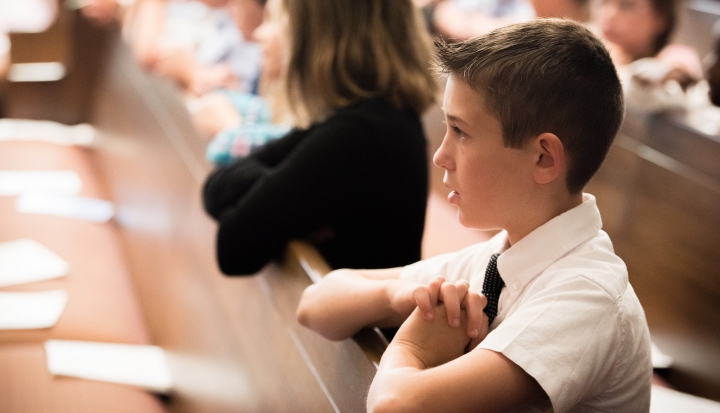Parents who want their children to grow in appreciation for and commitment to Mass are much like parents who are determined to make sure their kids go off to college loving vegetables. Both recognize that their child’s best opportunity for adult physical and spiritual health will come out of the habits they establish in childhood.
Parents who want vegetable eaters do more than threaten to take away dessert if the veggies aren’t consumed. They cook delicious soups chock full of vegetables; they make spinach lasagna; they plant gardens and make chopped salad with cucumbers and tomatoes that are just hours off the vines.
Similarly, parents who want to raise churchgoing children work hard to make the liturgy meaningful. They talk about the Mass with their children before they go; they whisper explanations during key parts; they discuss the homily afterwards; they play their favorite church songs on their iPod or cellphone. And if it seems that the Mass they usually attend is not particularly well suited to a certain child, they might try a Mass with a different homilist or a different style of music that will grab a child’s attention and imagination.
No, it’s not entertainment—it’s even better
David, father of third-grader Ethan and kindergartner Mara, went through the Rite of Christian Initiation for Adults (RCIA) program several years ago. He is struck by the difference between the Catholic Mass and the more contemporary Christian services of other denominations. While he has found value in both types of worship experiences, he and his wife bring their children to Mass weekly because Mass provides opportunities for contemplation and meditation.
“The world is a busy and stressful place,” he says. “On top of that, there is the constant interaction with technology that can fill any quiet time. Children need to learn how to relax and contemplate. Mass offers many opportunities. Watching Father Dennis prepare the altar for the Eucharist is an excellent example of how things should be done in general. It is a thorough process, done with complete attention and care for the details.”
If we make time for church, it must be important
While some parents struggle to fit in time for Mass amid the myriad sports and school activities, others say that their packed schedule reminds them of why it is so important to go to church.
“I find my children expect that this is just part of our routine,” says Kristi, mother of two. “Kids see that we make time for sports, going out to eat, running to Target—but it is just as important to put church in the mix. In our house it is just that standing commitment, and we work our other scheduled things around it.”
Parents with this view usually report that their children don’t ask if the family is going to Mass over the weekend; they ask when the family is going to Mass.
We go for the community—not just for ourselves
Anne, mother of three, says that her pastor, Father Jerry Herda, taught her a different view of Mass. He explained that sometimes we are not going for ourselves, but to be present for others who need to see us there on a given Sunday.
We may not know who in our community is struggling, who may need our handshake at the sign of peace, or our conversation after Mass, or just the safety that comes from the feeling of a full church.
“When I heard that, I thought, wow, I can do that,” Anne says. “I am pretty good at being there for someone, and boy did that make sense. If I could help my children understand this as well, then this was for me.”
Anne continues by saying, “I have since learned of great, happy moments and moments of tremendous sadness in church. While the news may lift my spirits or give me a heavy heart, I am glad to be there to support and encourage those who have chosen to take this journey with me.”
Kristi, whose kids go to a Catholic school, agrees with Anne’s remarks on community, adding that her children are quick to notice their peers in church. “They see their classmates at church and that is a huge benefit,” she says. “They see they are not the only ones who go to church.”
This article was originally published in the September 2012 issue of At Home with our Faith.
Image: Flickr cc via the Catholic Diocese of Saginaw















Add comment